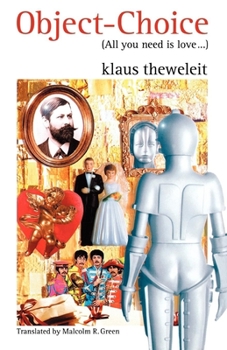Object Choice: All You Need Is Love
Whom do we choose when we fall in love? How do we make the love-object into what we want? These are questions which only became important at the end of the nineteenth century, as Freud began to formulate a new discipline which would be called psycholanalysis. Freud argues Klaus Theweleit, was the first theoretician of the new situation: boy versus girl in the world series of love. Theweleit looks at a number of relationships: Alfred Hitchcock and Alma Reville; the triangle of Hannah Arendt, Martin Heidegger and Elfriede Heidegger; Jung and Sabina Spierlrein. But the key figure is Freud himself. Who would, who could Freud choose? As it happened, Freud proposed to Martha Bernays. The 1,500 letters of Freud's courtship became something like the first psychoanalysis; without knowing it, Martha Bernays became an analytic-instance. But Object-Choice is not only a study of the founder of psychoanalysis, it is also an illuminating lexicon of love in the twentieth century. Freud is accompanied here by Jimi Hendrix, the Kinks and the Velvet Underground. Like Theweleits's Male Fantasies , this is a collage book, mixing auto-biography, theory and pop culture, and always haunted by history, above all the history of Nazism. As an epilogue, Theweleit brings Freud back to the scene of his courtship, and the Beatles back to Hamburg, in an exploration of that city's Wandsbek district, once home to an important Jewish community. His comments on the transformations and destruction that Wandsbek has endured form an elegiac tribute to German Jewry, and a powerful conclusion to this remarkable book.
Format:Paperback
Language:English
ISBN:0860916421
ISBN13:9780860916420
Release Date:May 1994
Publisher:Verso
Length:128 Pages
Weight:0.05 lbs.
Dimensions:0.4" x 5.3" x 8.5"
Age Range:18 years and up
Grade Range:Postsecondary
Customer Reviews
1 rating
Good, solid Theweleit.
Published by Thriftbooks.com User , 17 years ago
Klaus Theweleit, Object-Choice: All You Need Is Love... (Verso, 1990) Klaus Theweleit is one of those guys you probably should be reading if you have any interest in philosophy; very few people in the English-speaking world, however, have. This no doubt partially because only two translations of Theweleit have appeared in English, Male Fantasies (only volume I of which is available these days, for some silly reason; I've been trying to get hold of vol. II for a decade without success) and Object-Choice. No matter that the latter is a smaller piece of a draft of a much larger work, Theweleit's Freud bio, which is in turn part of a much large work. Will we ever see it? Who knows? But at least you can pick this up, which is roughly equivalent to being able to rent Matthew Barney's The Order without the rest of the Cremaster Cycle being available. Whereas Male Fantasies is a monstrous, imposing doorstop of a book, Object-Choice is slight, coming in at 112 pages. It is also more of a personal project, or so it seems from reading this one; it could be the fog of memory (I read Male Fantasies a decade ago), but I remember that one being drier, fuller of facts and footnotes. No less readable, mind you, I love it. But Object-Choice almost seems like Theweleit sitting across the table from you at a party, tossing back handfuls of peanuts while poking at Freud's theories of object-choice, relating them all back to events taking place in Freud's life while he was coming up with them. As a side note, the back copy makes great fanfare of the idea that all this started with Freud's fifteen hundred letters to his future wife Martha Bernays, in the course of which she became the first subject of Freudian psychoanalysis; the text itself, however, only mentions that in passing, spending more time focusing on Freud's relationship with Carl and Emma Jung. In any case, you'll probably either latch onto Theweleit or hate him. But you can't do either until you read him. *** ½






